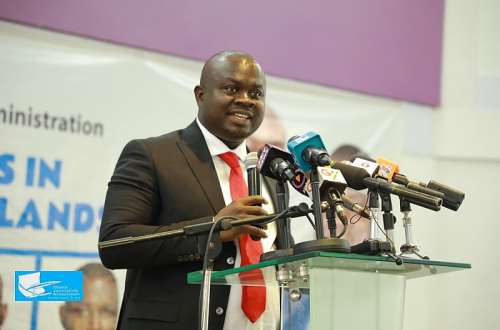adverts
Albert Kwabena Dwumfour, President of the Ghana Journalists Association (GJA), has made a heartfelt appeal to the government, judiciary, and Ghana Police Service to release the protesters from the Democracy Hub group who were remanded following a demonstration that turned violent in Accra.
The protest, which began peacefully from September 21–23, escalated into clashes between demonstrators and police forces. The protesters, who were advocating against illegal mining (galamsey), reportedly blocked roads, dismantled police barriers, obstructed traffic, and set properties ablaze near the 37 Roundabout. As a result, 54 protesters were arrested, with nine being sent to prison custody and the rest held by the police.
Speaking at the 28th GJA Media Awards on September 28, Dwumfour praised the Ghana Police Service for their professionalism in managing the situation but expressed concern over the decision to remand the protesters for two weeks.
adverts
He described the move as excessive and said it threatens the country’s image as a champion of human rights.
“I commend the police for their professionalism and restraint during the protest. However, we must not lose sight of the fact that remanding protesters for two weeks is too extreme and sends a negative signal regarding human rights in Ghana,” Dwumfour said during his speech.
He urged the authorities to strike a balance between enforcing the law and respecting the civil liberties of citizens. “We at the GJA believe in upholding the rule of law, but this must be done while protecting the rights of individuals. We call on the government, judiciary, and police to consider the immediate release of the protesters.”
Protest and Arrests
The Democracy Hub protest, which aimed to raise awareness about illegal mining, initially began as a peaceful demonstration but descended into chaos after confrontations between demonstrators and the police. Protesters were accused of engaging in violent activities, such as dismantling police barricades and burning property, prompting law enforcement to intervene and make arrests.
A total of 54 protesters were detained, nine of whom were remanded in prison custody, while the rest were held in police detention. The prosecution claimed the protesters obstructed traffic and caused destruction in the capital’s 37 Roundabout area, justifying their decision to hold the accused in custody.
Legal Disputes and Bail Denial
During a bail hearing, defence lawyers requested the release of the protesters, citing poor treatment while in custody. However, the prosecution insisted that the detainees were being treated fairly, even mentioning that they were receiving meals from popular local restaurant Papaye—a claim that sparked discontent from the defence team.
The prosecution opposed the bail request, expressing concerns over the inability to verify the residential addresses of some of the accused. Following these arguments, the judge denied the bail applications, remanding the protesters until their next hearing on October 8.
Human Rights Concerns
Dwumfour emphasised that Ghana’s global reputation as a protector of human rights could be at risk if such actions continue. “Ghana has always been viewed as a beacon of democracy and human rights in Africa. This situation does not bode well for our international standing,” he noted.
He called for a more measured approach in handling peaceful protests, especially when addressing critical issues like illegal mining, which affects the environment and the livelihoods of many Ghanaians.
Dwumfour’s appeal has added to the growing calls from various advocacy groups and activists for the release of the Democracy Hub protesters.
As the legal proceedings continue, the remanded protesters remain in custody, awaiting their next court appearance on October 8, while the broader conversation on human rights and freedom of expression in Ghana intensifies.


